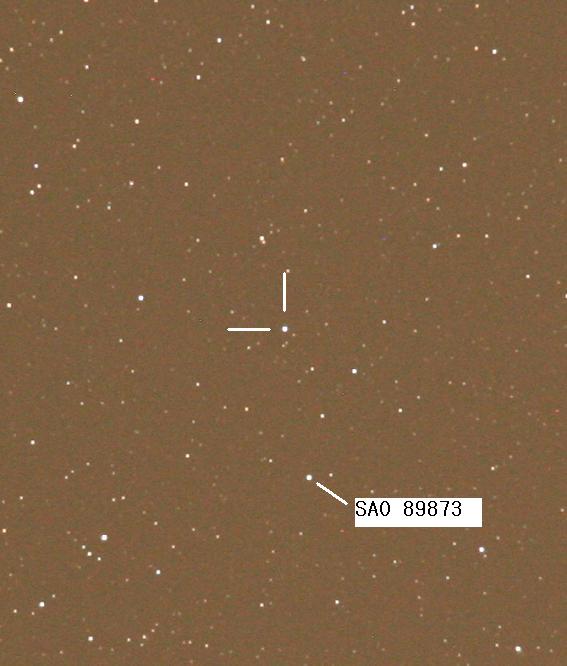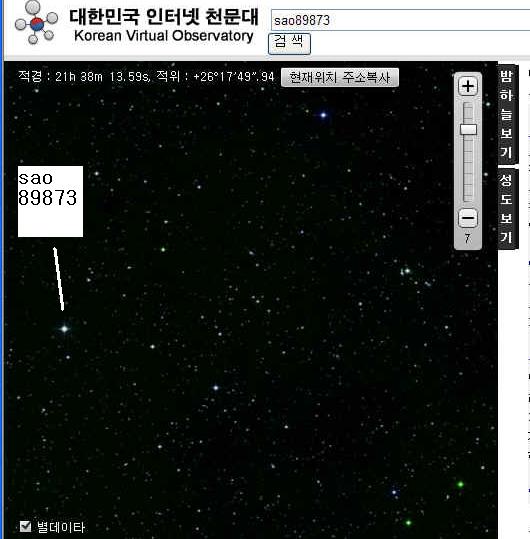

국산 혜성 YI-SWAN, C/2009 F6 의 발견자 이대암 선생님이 또 일을 저질르셨나봅니다 ->저지르셨습니다
페가수스 자리에서 이번 달 초에 10.8 등성의 신성또는 변광성을 발견하셨네요. -> 신성 NOVA
R.A. = 21 38 06.57, Decl.= +26 19 58.2
아래는 보내주신 메일의 내용(영문은 첨부화일의 text) 입니다.
(추가)인터넷 천문대에서 그 좌표 사진(당연히 신성은 안보이지요^^)을 켑춰했습니신다. -> 신성위치에 있는 보이는 별이 폭발했는지도 모르죠(나중에 알게되겠지요)
(추가-26일 아침)밝기가 10.8등성, 8.4(8.5)등성 두개가 표현되어있는데 '신성'이 대한민국에서 '신선'해서 어떻게 발견(2개의 전후 사진 비교,시간차는 얼마?)했는지
모릅니다, 25일밤의 날씨가 안좋아서 관측시도도 못해봤지만, 새벽에 찾아봐야 겠습니다. 새벽에 6시반쯤 자오선 통과네요.
-
안녕하시지요?
이제부턴 초신성입니다!
이대암
Date: Sat, 8 May 2010 01:49:22 -0400 (EDT)
From: quai@cfa.harvard.edu
Subject: CBET 2273: 20100508 : POSSIBLE NOVA OR NEW CATACLYSMIC VARIABLE IN PEGASUS
Electronic Telegram No. 2273
Central Bureau for Astronomical Telegrams
INTERNATIONAL ASTRONOMICAL UNION
CBAT Director: Daniel W. E. Green; Room 209; Dept. of Earth and Planetary
Sciences; Harvard University; 20 Oxford St.; Cambridge, MA 02138; U.S.A.
e-mail: cbat@iau.org; cbatiau@eps.harvard.edu
URL http://www.cfa.harvard.edu/iau/cbat.html
POSSIBLE NOVA OR NEW CATACLYSMIC VARIABLE IN PEGASUS
On May 7.4 UT, Dae-Am Yi, Yeongwol-kun, Gangwon-do, Korea, reported (via
H. Yamaoka, Kyushu University) the detection of an apparent new object
(mag about 10.8) on two images taken on May 6.77 with a Canon 5D digital
camera (+ 93-mm camera lens). Yi confirmed the object with a 400-mm lens
on May 7.76, when the object had brightened to mag about 8.4. The
confirmation image suggests that the brightened object is positionally
coincident with the GSC star 2197:886, whose catalogued position in GSC
version 2.3 is R.A. = 21h38m06s.571, Decl. = +26d19'57".33 (equinox 2000.0),
with magnitudes F = 13.88 and j = 14.57. Yamaoka notes that the Digitized
Sky Survey image of GSC 2197:866 is elongated toward the north-south,
indicating that it is a double/multiple star. Precise astrometry is
strongly needed of Yi's object. Yamaoka also notes that there is a bright
x-ray source (1RXS J213807.1+261958) near the position, which suggests that
the brightened object may be a cataclysmic variable star (classical nova,
dwarf nova, etc.).
NOTE: These 'Central Bureau Electronic Telegrams' are sometimes
superseded by text appearing later in the printed IAU Circulars.
(C) Copyright 2010 CBAT
2010 May 8 (CBET 2273) Daniel W. E. Green
-
Sunday, May 9, 2010
Cataclysmic Variable in Pegasus
CBET circulars No. 2273 &2275, issued on May 08, 2010, announces the discovery by Dae-Am Yi (Korea) of an apparent new object (mag about 10.8) on two images taken on May 6.77 with a Canon 5D digital camera (+ 93-mm camera lens). CBET 2275 reports independent discovery of the outburst of this variable by Shizuo Kaneko.
We performed some follow-up of this object remotely through a 0.25-m, f/3,4 reflector + CCD, from GRAS Observatory (near Mayhill, NM).
On our images taken on May 09.4, 2010 we can confirm the presence of an optical counterpart with unfiltered CCD magnitude about 8.5 (UCAC2 Catalogue reference stars) at coordinates:
R.A. = 21 38 06.57, Decl.= +26 19 58.2
(equinox 2000.0; UCAC2 catalogue reference stars).
Our confirmation image:
Please click here for a bigger version:
http://bit.ly/axXnjF
This is an animation showing a comparison between our image and the archive DSS plate (R Filter - 1991). The archive plates show a close pair of objects at the location of the outbursting variable (GSC 2197:886):
Please click here for a bigger version:
http://bit.ly/9jT4By
Based upon an examination of the POSS-I and POSS-II plates by Arne Henden (AAVSO), it is possible that the double is composed of two unassociated stars, one with a high proper motion.
Spectrum obtained on May 8.47 UT with the 1.82-m Plaskett Telescope of the National Research Council of Canada, shows strong H-alpha and H-beta in emission (HWFM 800 km/s). Another spectrum obtained using the 1.3-m ARAKI telescope on May 8.66 UT shows a blue continuum and a weak H-alpha emission line, suggesting that the object would be classified as a dwarf nova. (cf. CBET 2275).
According to Taichi Kato (VSNET), given the current brightness (and no known past outburst record), the object may be a large-amplitude WZ Sge-type dwarf nova undergoing a rare outburst!
by Ernesto Guido and Giovanni Sostero


